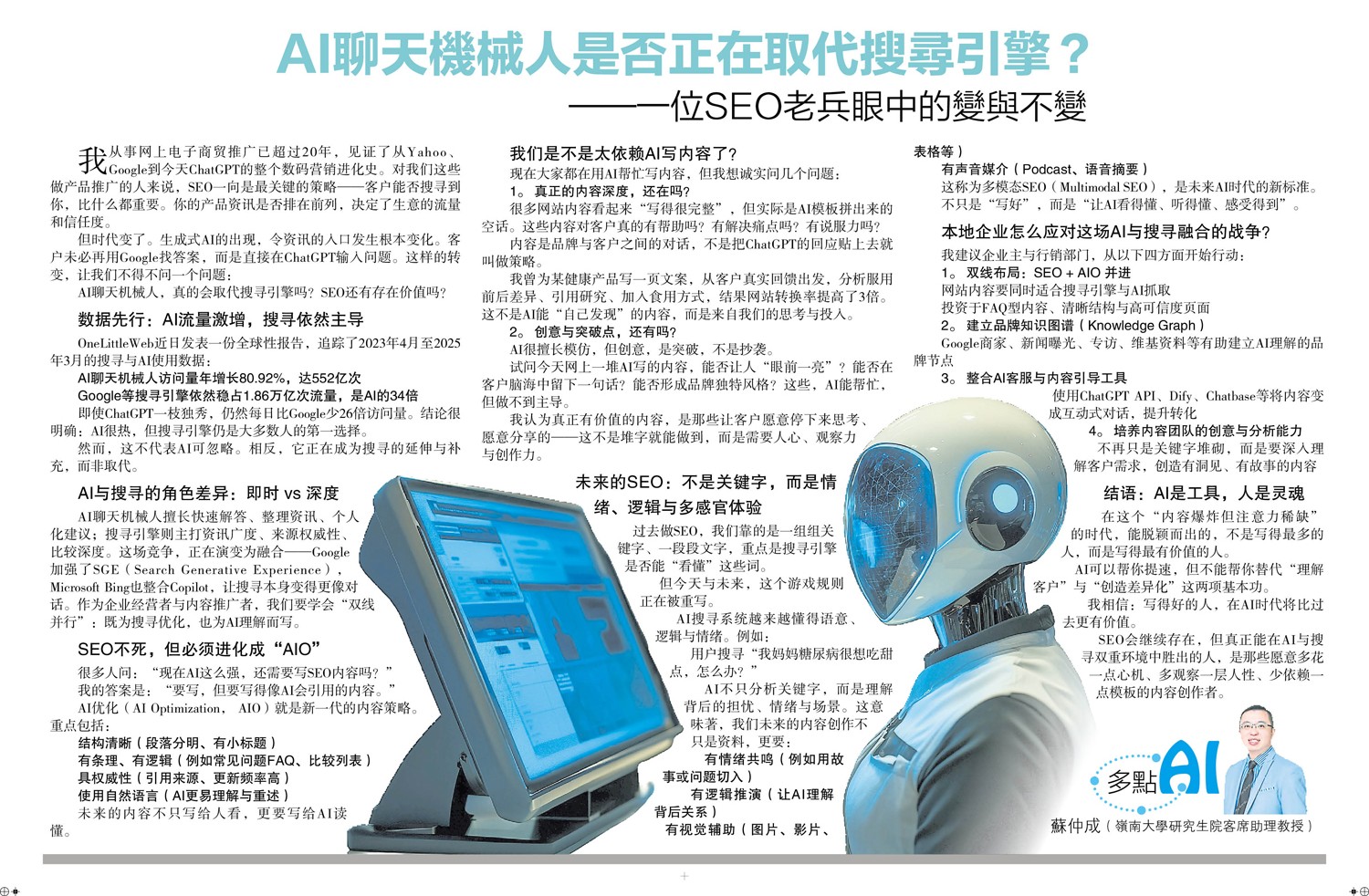Embracing the Future: AIX Society Applauds Hong Kong’s 2026 Budget and Pledges to Co-create a New AI Era
AIX Society applauds the Hong Kong AI Budget 2026, welcoming HK$100M+ in AI investments, an

— A Veteran SEO’s View on Change and Continuity published on Sin Chew Daily on the 18th of June, 2025
I have been involved in e-commerce promotion for over 20 years and have witnessed the evolution from Yahoo to Google to today’s ChatGPT. For those of us who create content, ChatGPT brings a major shock. SEO, once a highly valued and technically skilled job, is now seen as facing extinction. Whether to continue in this career has become a serious decision for manypractitioners.
But the truth is, in the age of digital transformation, most business goals remain unchanged. Customers still search on Google, and even if they turn to ChatGPT, their purpose remains the same. The tools may change, but the essence does not.
So, what is the real impact of AI chatbots on SEO? What has changed, and what remains unchanged?
A report by OneLittleWeb shows that global search traffic continued to grow steadily from March 2023 to April 2025.
Even though ChatGPT and other chatbots have generated a lot of buzz, they still cannot fully replace traditional search engines in terms of information accuracy, trust, and timeliness.
AI chatbots offer real-time interaction and are good at summarizing answers. However, for users who want to explore deeply or verify information, traditional search still provides more credibility and broader sources.
Generative AI enhances the experience of search rather than replacing it. Google’s integration of SGE (Search Generative Experience) and Microsoft Bing’s integration of Copilot show that AI is becoming a new layer of search, not a replacement.
So, SEO is not dead, but it must evolve into “AIO” (AI + SEO).
Many people mistakenly think AI is just another form of “copywriting.” In fact, the future of SEO is more about scenario design, logic-based interaction, and AI-enhanced experiences.
Examples include:
A common mistake today is letting AI write low-quality content in bulk. This might temporarily help rank pages, but in the long term it lowers user trust and damages the brand.
Even if you use ChatGPT to generate a large amount of material, it still needs to be manually checked, localized, contextualized, and made emotionally resonant to be effective.
So, don’t fight AI—work with it. Find the best integration point for your brand and message.
The future of SEO won’t be about keyword stuffing, but rather multimodal expression that engages multiple senses.
For example:
AI is here to stay. But SEO is not dead—it’s simply evolving into a new form.
The most important thing is: AI cannot replace your understanding of your users.
AI can be used to help, but not to replace the unique human insight you bring.
In the future, SEO professionals must become designers of content experiences, guiding users through a journey with logic, emotion, and technology.
Columnist: 多點AI — Michael So (Adjunct Assistant Professor, Lingnan University)
AIX Society applauds the Hong Kong AI Budget 2026, welcoming HK$100M+ in AI investments, an
Customer service is often the difference between a loyal customer and a lost one. Yet
Creating, managing, and sharing documents has always been central to enterprise operations. But in a
HKOEA Consultancy
Licence No. 59684
© 2025 Artificial Intellegence Application Research Society. All rights reserved
by Originals Group – Hong Kong, Malaysia, GBA